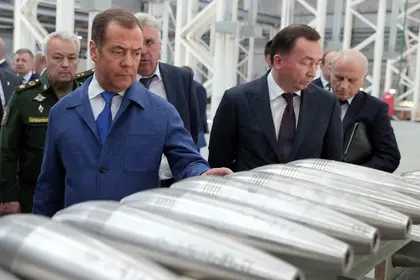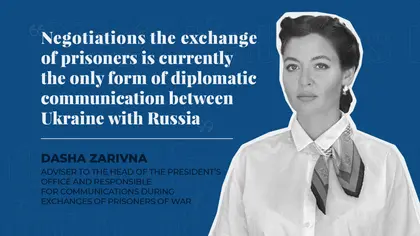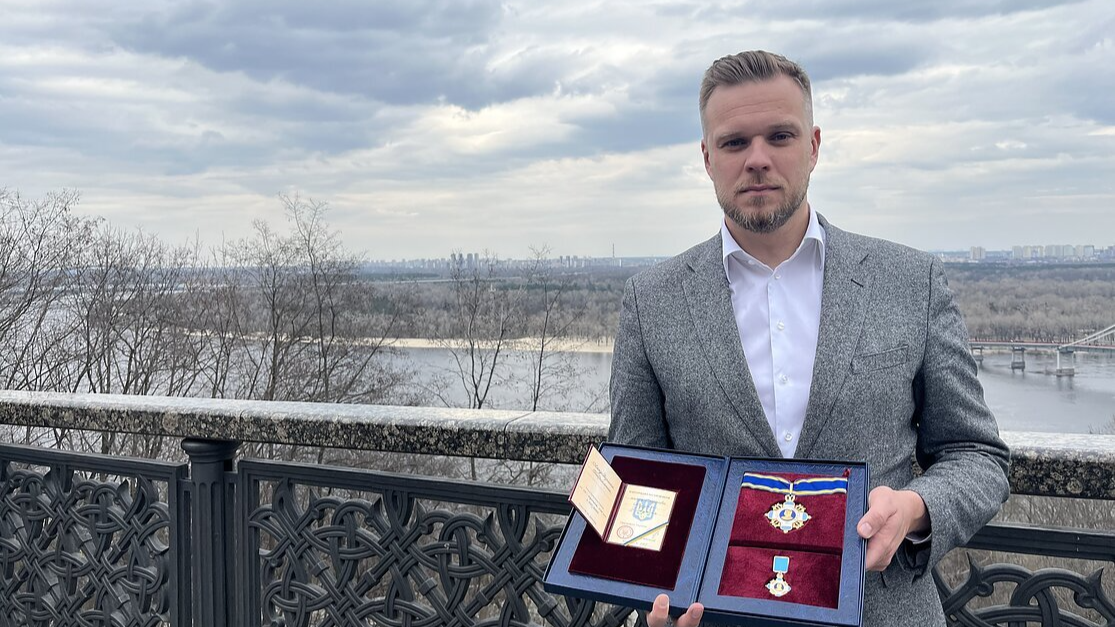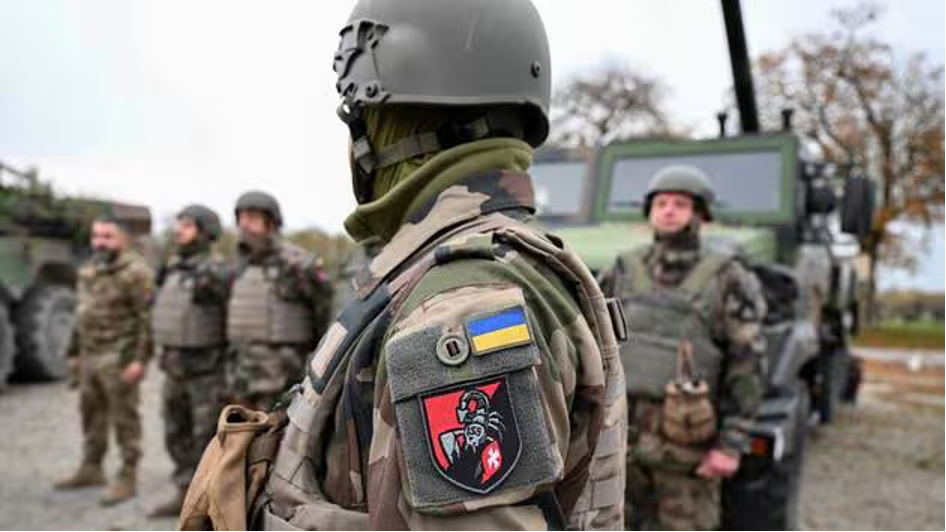The Coordination Headquarters for the Treatment of Prisoners of War on Jan. 14 reported a disruption to the exchange of prisoners. At the last moment, Russia refused without explaining reasons.
Dasha Zarivna, adviser to the head of the President's Office and responsible for communications during exchanges of prisoners of war (POW), told Kyiv Post that it happens quite often. The Russians try to up the stakes and use mechanisms such as pressuring the relatives of Ukrainian prisoners to publicly call for the return of their family members.
- Obtain the most recent updates on the Ukraine situation today.
- Russian Losses in Ukraine War
JOIN US ON TELEGRAM
Follow our coverage of the war on the @Kyivpost_official.
Zarivna in an interview with Kyiv Post, explains why too much media attention calling for the release of particular captives can actually harm Ukrainian POWs. She also explains how exchange lists are formed and whether Ukraine knows the whereabouts of all prisoners.
How does the exchange process take place? How are exchange lists formed?
Negotiations regarding the exchange of prisoners is currently the only format of communication with the Russian side. They are held through the Coordination Headquarters for the Treatment of Prisoners of War. President Volodymyr Zelensky has repeatedly emphasized that human life should be the highest priority of the Ukrainian authorities. He set a clear task to save our people.
The headquarters include representatives of the Defense Intelligence, the Interior Ministry, the State Security Service, the Armed Forces of Ukraine (AFU), the Defense Ministry, the National Guard, the Border Guard Service, the Justice Ministry, the Ministry of Reintegration of the Temporary Occupied Territories, as well as Commissioner for Missing Persons Oleh Kotenko and Verkhovna Rada Commissioner for Human Rights Dmytro Lubinets. They all play an active part in the activities of the headquarters.

‘A Gangster Threat That Smacks of Desperation’ – Ukraine at War Update for Dec. 19
Head of the President's Office Andriy Yermak coordinates the process of exchange, in particular contacting international partners. For example, he planned activities as part of the large-scale exchange conducted in September.
There is a special negotiating group within the headquarters where all discussions regarding exchanges are held. Ukraine has a register of the National Information Bureau, which contains information about prisoners and missing persons. The entire register, that is, everyone who is registered as a prisoner of war or missing, is submitted for exchange. This information can be provided by family members, relatives, military units, investigators, security services, etc.
We should understand that the primary task of the Ukrainian authorities is to return our people, while Russia is less motivated.
The headquarters takes the position that everyone registered as captured or missing should be found.
Sometimes it can happen that during an exchange that a third of our defenders, whose fate was previously unknown, return home. However, negotiations are very difficult every time. Work on several exchanges can continue in parallel and can be at different stages. Various structures are involved in the process. Unfortunately, exchanges are often disrupted or postponed.
How is it determined who should be returned from Russian captivity this time?
If we talk about priorities and who is exchanged first, we always try to exchange those who are seriously injured and sick. Unfortunately, it is impossible for all exchanges to follow the same modes of prioritization.
How do the parties exchange the lists? Do they send them by email or some other way?
Ukraine uses all available communication channels, both open and closed. Unfortunately, I cannot disclose further details for security reasons.
Should relatives try to draw the attention of the media to their family members who are in Russian captivity?
There are two approaches to how to behave: whether to draw attention to the return of certain people or, on the contrary, not to mention them so as not to raise the "price" of the captive in the media. I believe the second scenario is preferable and rational because it is easier to return a person that way.
We should understand that the primary task of the Ukrainian authorities is to return our people, while the other side is less motivated because people are of little value to their authorities. Therefore, the very fact that these exchanges take place is the result of constant hard work of the teams involved in this process.
The Coordination Headquarters are doing things that seem impossible. As a person in the President's Office who leads communication regarding the exchange of prisoners, I observe the work of Andriy Yermak on the matter, communicate a lot with all the participants in this process, and can say that our common and most ardent desire is to return everyone. It is, without exaggeration, the main idea that unites those involved in this process, and this motivates us.
It is very difficult to obtain information about the actual whereabouts of our citizens in captivity. However, we have many sources.
It is very important not to respond to enemy provocations. It’s beneficial for the enemy when our captives get much attention, when their relatives go out for rallies and demand their return. As a result, they set much higher demands regarding the exchange of such prisoners, and we end up facing tougher [negotiation] conditions.
The enemy also calls the family members of prisoners and says that their relatives are in Russian captivity and asking why they are not doing anything nor fighting for their release. It puts psychological pressure on people.
Does Ukraine know about all of its soldiers in captivity?
We have the National Information Bureau which anyone can provide with information about a person who is missing or being held captive. You can make a phone call or contact them via a chatbot. Then, information about whether the person is in captivity is checked.
I'd like to emphasize that the bureau, law enforcement agencies and the Coordination Headquarters are official structures to which information about a person can be given. However, you should be careful with any data about people in captivity. Do not share it with people you do not know.
Unfortunately, many of our citizens are considered officially missing. Russia reluctantly fulfills the requirements of the Geneva Conventions and does not always inform the International Committee of the Red Cross about our citizens in captivity.
We know at least about all those Ukrainians whose relatives, military units, commanders, etc., have contacted us and informed us about their disappearance. [More] information often comes from those who have already been released from enemy captivity. Every time [when lists are formed] we submit names to the Russian side of all these people who are in captivity and who should be exchanged.
Does Ukraine know about the location of prisoners?
We do not always know exactly where they are and in which specific institutions. After all, the Russians often send prisoners from one place to another. Therefore, even when our soldiers return from captivity and provide information about the whereabouts of others, they are not definitely still there. They simply could be moved to another place, another region.
Unfortunately, it is very difficult to obtain information about the actual whereabouts of our citizens in captivity. However, we have many sources.
We do not comment on the number of our prisoners in Russia, but Ukraine certainly has these data, in particular, how many defenders of Azovstal are there.
Most exchanges take place on the demarcation line and these are always in different places.
When Viktor Medvedchuk was among those to be released to Russia, did Ukraine set conditions regarding the number of prisoners it wanted back in return?
At first, negotiations began regarding the return of 50 of our soldiers in exchange for Medvedchuk. But in the end, we reached a figure exceeding 200 people, which is an example of Ukraine's effective work.
During one of the most recent exchanges, we released a priest of the Moscow Patriarchate. That is, we offered and they agreed?
There was a request from the Russian side to exchange him – not just a representative of some denomination but a state traitor whom the enemy wanted to exchange. He himself wanted to get to Russia, and we took advantage of this. This story is similar to the one with Medvedchuk but, of course, the priest was not exchanged that way.
We hand over to Russia its agents who worked in Ukraine. Is there any threat to our country that these people will say something that can harm us?
All these risks are assessed and checked in the process. And let me remind you once again that Medvedchuk was released only after he had given evidence.
In late November, British news service Reuters reported, citing its sources, that the Ukrainian delegation had a secret meeting with the Russians in the United Arab Emirates. They discussed the resumption of ammonia exports by Ukraine and the exchange of prisoners. How often are such meetings held?
I can't comment on that. I can only say that the president set a clear condition: any substantive conversations on this matter can be started only in case of agreement on the exchange of POWs in the "all for all" format.
Are there journalists in Russian captivity and, if so, how many?
Yes, there are. There are cases when Ukrainian journalists have been taken prisoner. We should understand that when a journalist is a civilian, he is considered a hostage, not a POW. He is a non-combatant. According to the Geneva Conventions, Russia must release such people without any condition. However, if a journalist joins the army, the rules of the Geneva Conventions apply to him as a combatant.
As for civilians illegally detained in Russia, how many have already been returned to Ukraine?
At this moment, Russia has returned 106 civilians. According to international regulatory documents, the Russian Federation must release civilians as non-combatants unconditionally, without involving them in the process of exchanging POWs.
How are negotiations on the place for the exchange of prisoners going?
Most exchanges take place on the demarcation line (between Ukraine and Russian-occupied territories) and these are always in different places. But there are exceptions, in particular when exchanges take place abroad.
For example, remember when part of the largest exchange of 215 prisoners at that time took place in Turkey, some were flown to Riyadh, Saudi Arabia and released there.
You can also highlight the text and press Ctrl + Enter









